Soul of a Gunslinger Read online
Warning: The unauthorized reproduction or distribution of this copyrighted work is illegal. No part of this book may be scanned, uploaded or distributed via the Internet or any other means, electronic or print, without the publisher’s permission. Criminal copyright infringement, including infringement without monetary gain, is investigated by the FBI and is punishable by up to 5 years in federal prison and a fine of $250,000 (http://www.fbi.gov/ipr/).
Published by The Hartwood Publishing Group, LLC,
Hartwood Publishing, Phoenix, Arizona
www.hartwoodpublishing.com
Soul of a Gunslinger
Copyright © 2018 by Jim Cox
Digital Release: June 2018
All Rights Reserved. No part of this book may be used or reproduced in any manner whatsoever without written permission, except in the case of brief quotations embodied in critical articles and reviews.
This book is a work of fiction. The names, characters, places, and incidents are products of the writer’s imagination, or have been used fictitiously and are not to be construed as real. Any resemblance to persons, living or dead, actual events, locales, or organizations is entirely coincidental.
Soul of a Gunslinger by Jim Cox
Desert heat and freezing mountain temperatures have nearly meant Lefty’s demise in his long chase for gold, but now another obstacle has surfaced to keep him from his fortune—a young abandoned girl. Should Lefty continue chasing after gold or help the girl? He wants gold but on the other hand, she’s mighty pretty.
Dedication/Author Notes/Acknowledgements
Brad
Prologue
When gold was discovered in the California Mountains in January 1848, people had no idea what chain of events would follow.
People from the surrounding area flooded the mountains with their picks and pans, but the real influx of people came when President James Polk confirmed the discovery of gold in an address to Congress. The President’s confirmation started a worldwide migration to northern California expanding San Francisco’s population from two-hundred in 1846 to a boomtown of more than thirty-six thousand full-time residents by 1852. However, including visitors, the population reached ninety-thousand in 1849. Half came by sea and the others by land. Of these, about a third were from other countries: China, Mexico, Great Briton, Australia, France, and Latin America, among others.
The San Francisco Bay became full of abandoned ships that had come to the area with goods and supplies, only to have the shipmates leave in pursuit of gold. Most of the ships were torn apart for their wood, but many were brought to the shore-line and converted into warehouses, stores, taverns, hotels, homes, and one into a jail.
Laws and law enforcement in the San Francisco area were built around a meager population of a couple hundred passive people, and not equipped to handle the influx taking place. Consequently, in 1849 a state constitution was written, a state’s legislature was chosen, and an interim first governor was put into place. In September 1850, California became the thirty-first state.
For people outside the surrounding territories, there was no easy way to get to northern California. The first Argonauts, as gold-seekers were sometimes called, traveled by sea around the tip of South America, taking up to eight months to get to the gold. There were two routes in the U.S. to get to the gold. One was through the middle of the country, but this route was restricted during the winter months because of snow in the mountain passes. The second main route was the southern route which required crossing deserts that were nearly unbearable and resulted in hundreds of deaths. No matter the route taken, they were all dangerous. Shipwrecks occurred, diseases ran rapid, mainly typhoid fever and cholera, poison snake and insects were a problem, people starved and died from the lack of water. Thieves and murderous bandits were prevalent, and being stranded because their horses or oxen died was an ongoing threat. However, these hardships didn’t hinder the people; they continued to come by the thousands.
The menagerie of people who came varied greatly. Foreign nationalities had problems of blending in with the westerners. Their clothing, customs, religions, and language were different and not accepted. Most who came were men, but a small percent of women and children also came, especially in the beginning. They came to be with their husbands. Some came because their husbands had sent for them, and other women came because of the economic possibility. Women filled many roles. Some worked beside their husbands panning gold, some owned or ran boarding houses. There were wives and mothers, single entrepreneurs, shop workers, and prostitutes. Some became rich, but most remained poor. Many women were widowed due to their husband’s mining accidents, diseases, or murdered from mining disputes.
With the influx of this many people, lawlessness abounded. Killings were too numerous to keep track of in the gold fields or even in the city of San Francisco. There were men who thought they were too important to work in the gold fields, so they got their money from cheating at card games, robbing, and stealing cattle. Some hired their guns out for malicious tasks. There were many gunslingers walking the streets of San Francisco. Some were honest men, but most were not. Some wanted a reputation but didn’t have one. Some didn’t want a reputation but did.
Such was the case of Albert —Lefty— Newman. He didn’t want to be known as a gunslinger, but nevertheless, he was. It all began when he was a young man living on a small ranch in Pecos, Texas, with his mother and older brother.
Chapter One
It hurt like crazy, but Lefty wasn’t going home to face his ma with whiskey breath and a fresh bullet hole in his right thigh, no matter how much it hurt. He tried twisting and turning his leg every which way, but the hurt wouldn’t let up a bit, so he decided to lean back against the big pine tree he was sitting beside and bear the pain.
This was his secret hiding place. A place he often came too when he had something weighing on his mind, such as a disagreement with his brother or Ma or some other problem he’d run up against. It was atop one of the highest plateaus in the Franklin Mountains, not far from his home as the crow flies. In fact, the plateau was so high-up that he could see the little town of Pecos, Texas, situated in the flatland between the Sierra de Juarez Mountains and the Franklin Mountains, nearly fourteen miles away.
Today was different than most times because of the bullet hole in his leg. Normally his hide-a-way was peaceful and a good place to think. The sky was generally cloudless with a bright sun, and the air was always comfortable from the mountain-top winds. A small, gurgling mountain stream ambled lazily down the mountain in a see-saw faction not far from his fire.
The jabbing pains had been almost unbearable when Lefty hobbled around gathering firewood when he first got to his hideout, but he managed to get a fire going in spite of the pain, and by now the coffee pot of water sitting on a flat rock at the fire’s edge was almost to a boil. Star, his amber-colored gilding with a white splotch on his forehead was busy chomping on sprigs of mountain grass in an open area not far away.
It seemed like the hurt was getting worse. Every time he moved his leg to a different position, pains shot throughout his body causing him to grimace. Once, when the hurt had settled a bit, Lefty thought about how he’d gotten shot, but he didn’t remember reloading his gun, so he pulled the Colt revolver from his holster hanging on his left side and turned the cylinder, checking for any spent shells; there were none. He must have reloaded out of habit.
Lefty knew the bullet hole in his leg needed fixing, but he still wasn’t ready to face his ma, so he put his pistol back in the holster and laid it on a rock beside him. Then he turned to his injured leg. His pant leg and the bandanna he had tied around his leg to stop the bleeding were soaked in blood.
He wanted to take a closer look at his inju
ry to determine how bad it was, but he didn’t want to cut a hole in his breeches for his mother to mend, so he stood and pulled them down. The bullet’s entry and exit holes were still trickling a bit of blood but had nearly stopped. He was lucky the bullet didn’t hit a bone but had gone all the way through and out the back side of his thigh, about halfway between his knee and hip. Lefty pulled his pants up and hobbled to the creek to wash out his bandanna. After douching the bandanna with hot water from the pot, he cleaned the holes the best he could. Lefty had heard bullet wounds needed to be treated to keep infection down, and the best treatment was whiskey. He didn’t have any whiskey, so he’d use the second-best treatment he’d heard of which was tobacco.
Lefty spit his tobacco juice against a nearby tree and then wallowed out the wad of chewing tobacco lodged in his right cheek. After refilling his jaw with a good-size pinch of fresh tobacco from the pouch in his shirt pocket, he got another pinch of tobacco and stuffed it into the front and rear bullet holes. It stung something awful, but he hoped it would keep the infection down. After getting the fresh wad positioned in his cheek, he re-tied the bandanna around his leg, pulled up his pants and hobbled off to get ground coffee from Star’s saddlebags.
The young man’s Christian name was Albert Newman, but his folks had pinned Lefty on him at an early age due to being left-handed. He would soon be eighteen. Lefty was a tall, gangly young man who seemed to be all arms and legs. He was a mite homely with a long narrow face, beady eyes, a big nose, and his clean-shaven face made his ears stick out even more. He kept his unruly brown hair under a shapeless, black-crowned western hat most of the time. Lefty didn’t have much going for him except for his fast draw and accuracy with his pistol. He had bought his Colt double action revolver hanging from his left side from a gunsmith in Pecos three years ago and had practiced shooting almost daily. Not because he wanted to become a gunfighter or use the skill for protection, he only did it for enjoyment.
Lefty lived with his ma and an older brother who he called Bub on the Newman Ranch, a small spread in a valley of low rolling hills between two mountain chains. The family held no legal ownership papers whatsoever. Their small log cabin was almost invisible among the boulders at the foot of the west mountain near a good-size mountain stream. Their log barn sided the stream not far from the house. The cabin consisted of two rooms. His ma’s bedroom was in the back, and the front room was wide-open with a rock fireplace on the east wall. A long eating table which took up a great deal of the room’s space sat in front of the fireplace and was where the family spent a good bit of time. An overhead loft covered half of the front room and served as the boys’ bedroom.
The ranch was miles from their closest neighbor, so their small herd of Longhorns could graze on the open range as they pleased without any complaints. Settlers coming west avoided the area the ranch was in and continued traveling on to New Mexico because of the quarreling that still existed between citizens with Mexican decent and the eastern folks who had previously come to the area and carved out Texas from Mexico. The territory had been reclaimed by Mexico at the battle of the Alamo on April 1836. However, Texas’ independence as a U.S. Territory was regained shortly after the Alamo battle when Sam Houston’s army won the battle at San Jacinto. Division still remained, and Houston’s victory had been twelve years ago.
The throbs in the boy’s leg were becoming stronger, especially when he leaned forward to pour another cup of coffee. As he sat holding his steaming coffee, he stretched his leg into a different position which helped some. Then he tried to get his mind on something besides his leg pain, so he started thinking about his days-gone-by.
I was eight years old, he thought, when Ma and Sis called me and Bub in to eat when we heard hoof beats. We all went to the porch to see the rider in, who turned out to be a messenger from Sam Houston telling us Pa had been killed serving the great Republic of Texas. The news had been hard to swallow and caused tears, but in reality, it wasn’t much of a surprise to any of us. Pa had been on the killing lines in Texas’ battles for years, and his death was most apt to have happened since he was in the middle of flying bullets a good bit of time.
Things were never the same after we learned of Pa’s death even though he was never home much when he was alive. Before he was killed, we all knew he was the head of the house, and his rules were to be followed even though he was away.
Ma did her best to maintain our way of life after Pa’s death which included each of us doing our share of the work and follow the Golden Rule which in his Ma’s mind included everything right and moral. We three youngsters did our best to do what Ma said, and most of the time we did, but being youngsters, we slipped quite a bit.
Bub grew up fast after pa died. He thought he was all growed up when he turned seventeen and finagled his way into being the boss of the house, telling everyone in the family what to do, especially me who was eleven at the time. Ma didn’t seem to mind Bub taking over and after a spell handed the reins over to him completely. Two years after Bub took over, Sis, who was fifteen at the time, ran off with a peddler from New Orleans, never to be seen again.
Lefty thought about the family’s living conditions. Times were a struggle for the family and had been ever since he could remember. They never seemed to have any money, not much anyway, but they never went hungry. They had a large garden that grew year-round due to the warm climate. They had eggs from the yard chickens, hogs growing in a pen, there was always a beef hanging, and two milk cows, named Blue and Brown who gave plenty of milk. The family’s cornfield grew beside a stream at the foot of the mountain where it got plenty of water. They always plant several acres because their family likes hominy and grits made from it, but mostly, the corn was needed for livestock feed. They also grew a couple of rolls of tobacco besides the corn, and after it matured, they put it in the barn’s smoker-room for a couple months before chewing it.
Bub taught him to chew behind the barn, hidden from Ma, when he was thirteen. Bub had already been chewing for a couple of years. They rolled and smoked cigarettes from time-to-time, but they chewed mostly. The only time the boys didn’t have a plug in their jaws is when they ate or slept. Ma didn’t like the habit, and they had to be careful with their tobacco juice when they were inside the house, or she sent the boys outside.
The family’s trips to Pecos were a journey in and of itself. Pecos was their closest town and was sixteen miles south of the ranch. The town was located on the west bank of the Pecos River at the eastern edge of the Chihuahua Desert in the far southwestern corner of Texas. It’s nearly two-hundred miles north of Mexico. The three of us would leave home in our two-horse buggy before daylight on a Saturday morning, get there in late afternoon, and spend the rest of the day wandering around with nothing particular in mind. Ma always slept under the wagon when we traveled, and Bub and me sleep under the stars. After church service on Sunday, we’d start home unless there’s an after-church picnic.
When a burned-down log fell in the fire, sending up a bellow of sparks, Lefty jumped which caused sharp pains to run up and down his leg with a quenched face. He put pressure on his leg with both hands in hopes it would relieve some of the pain. It helped a little, but it also brought to mind how he got the injury earlier in the day.
The day had started off hot and dry. Tumbleweeds were rolling about, and sandy wind spirals were formed by the strong wind. It never rained much in this part of the country, but this was the worse year in a long time. It hadn’t rained since the middle of December, and it wasn’t much of a rain even then.
Lefty recalled stepping into the stirrup at first light and heading for Pecos. It was unusual to be going to town without Bub and his ma, but he needed to buy gunpowder to refill the empty cartridges he kept gathered up after his shooting practice. When he passed the saloon doors on his way to the gunsmith, he seemed to be pulled through the doors to see what was going on and to pass time. He’d been in the saloon with Bub a few times before but not many. His ma didn’t approve of su
ch places, but whenever possible, he and Bub would slip off from their ma while she shopped in the mercantile and go to the saloon for a drink or two.
Lefty remembered buying a shot of whiskey that morning and taking a seat at an empty table beside a table of card players. The men were playing five-card stud for high stakes, while a barmaid dressed in frills kept their whiskey glasses full. The men were cussing a lot, especially when their losing hands had to be thrown in, which irritated Lefty. He wasn’t offended when men cussed a little, he even used a few cuss words himself on occasion, but there was no need going off the deep-end like those card players. One man, in particular, was starting to get loud and obnoxious. He was a red-faced, round-chested man of average height, strutting about like a banty rooster, and doing most of the talking at the table.
The boy had heard enough of his kind of talking, so he threw downed the last of his drink and was about to stand when he overheard the loud, obnoxious man say, “I ain’t for sure why folks in this part of the country hanker-up to this here Sam Houston fellow, putting him up on pedestal like he was some kind of a king and making him the head man of Texas. He ain’t nothing but a fast-talking coward, always running off with his tail between his legs every time fighting breaks out. I figure him to be a yellow-belly finagler who’s got folks hornswoggled.”
The red-faced man doing all the talking wore a tall, wide-brimmed, black hat over his greasy brown hair hanging nearly to his shoulders. Several days of whisker stubble covered his tanned face. The only other thing noticeable about him was the tied-down pistol hanging at his side.
The young saloon girl was pouring another round while the red-faced talker gathered in the cards. It was his turn to shuffle and deal. “Like I was saying,” the talker said as he started dealing the cards, “Sam Houston ain’t nothing but a yellow-belly…” The man didn’t finish his sentence because Lefty cut ‘em off. He couldn’t stand to hear the way the obnoxious man was talking about Mr. Houston. Lefty stepped directly across the card table from the man and looked him square in the eyes. “Ya better take those words back, mister,” he said in a strong voice with dancing eyes. “I ain’t letting nobody getaway talking about Mr. Houston that way.” The talker only laughed and shrugged the whole matter off, but he should have been more concerned. Lefty might be tall and gangly, but he’s pretty good when it comes to drawing and shooting a pistol.

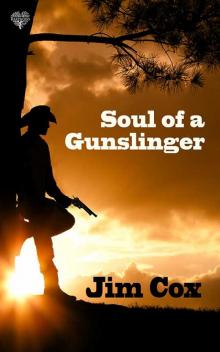 Soul of a Gunslinger
Soul of a Gunslinger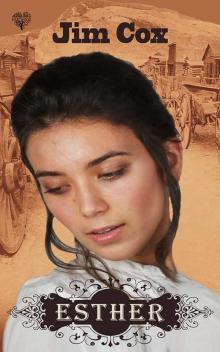 Esther
Esther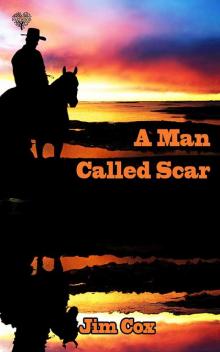 A Man Called Scar
A Man Called Scar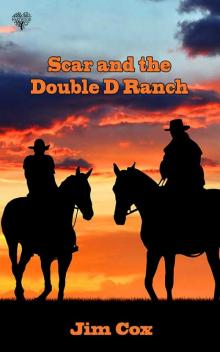 Scar and the Double D Ranch
Scar and the Double D Ranch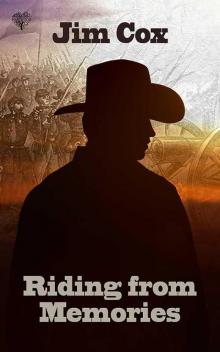 Riding from Memories
Riding from Memories